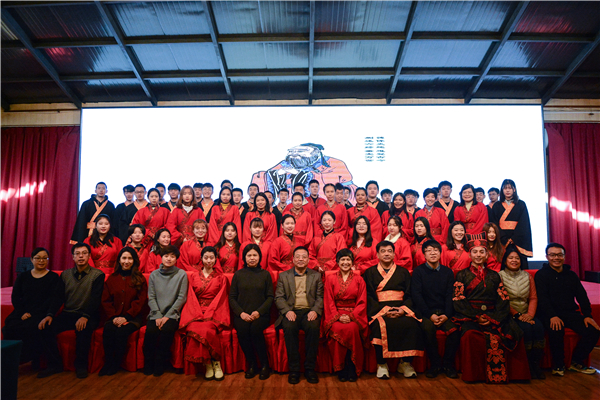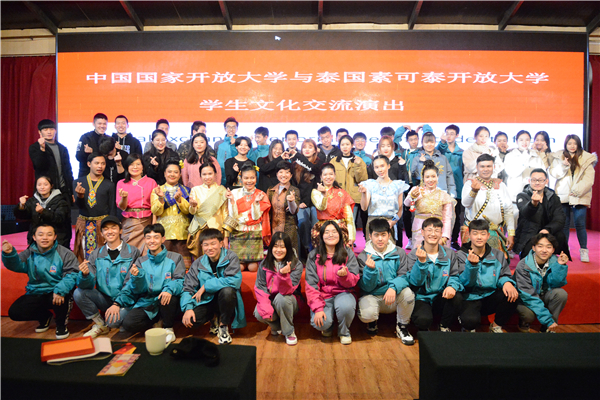 From 12-13 December 2019, 15 teachers and students from Sukhothai Thammathirat Open University (STOU) paid a two-day cultural exchange visit to the OUC. The delegation was led by executive vice president of STOU, associate professor Thapanat Prom-In, along with four teachers and 10 students from the Faculty of Arts, the School of Management, the School of Law, the School of Human Ecology, and the School of Politics.
From 12-13 December 2019, 15 teachers and students from Sukhothai Thammathirat Open University (STOU) paid a two-day cultural exchange visit to the OUC. The delegation was led by executive vice president of STOU, associate professor Thapanat Prom-In, along with four teachers and 10 students from the Faculty of Arts, the School of Management, the School of Law, the School of Human Ecology, and the School of Politics.
In March this year, a delegation led by then executive vice president of STOU, professor Krisana Rungrojwanich, visited the OUC. The two sides signed a memorandum of cooperation and promised to strengthen cooperation in the areas of curriculum development, teacher-student exchange, and scientific research. This event effectively implemented the cooperation content listed in the memorandum of cooperation between the two universities. It was also the first time that the OUC had received a delegation of students from an overseas open university for a short-term cultural exchange. It is part of the OUC’s contributions to the Belt and Road Initiative and will help to strengthen cultural exchange and cooperation with countries along the route of the Belt and Road.
The teachers and students from STOU visited the OUC's "Internet+ University" operation and exhibition centre. Professor Liu Yongquan from the International Language and Culture Teaching Department gave a wonderful lecture on Chinese language and culture to the teachers and students. After listening to Professor Liu's lecture, everyone expressed their admiration for the richness and depth of Chinese traditional culture.
The teachers and students from STOU also visited the social practice centre of the OUC Experimental School in Xiudegu and experienced traditional Chinese culture and art with the students of the OUC Experimental School Tianxiang Campus and the Beike Study Centre. Yang Xiaotang, vice president of the OUC, also joined the teachers and students to experience a variety of traditional Chinese cultural courses, including traditional Chinese etiquette, traditional costumes, paper-making, tie-dyeing, and guqin (a famous traditional musical instrument). They learnt about the essence of benevolence and filial piety in Chinese Confucian culture by studying Chinese traditional etiquette; experienced the connotations of Chinese traditional dress by wearing Chinese clothes and learning a traditional bow; and experienced the greatness and charm of Chinese intangible cultural heritage through the dyeing and paper-making class.

After the cultural experience course, the teachers and students of STOU and the students from the two study centres held a friendship party. They deepened their understanding of Chinese culture and made precious new friends. After the event, Thapanat Prom-In said that the cultural exchange activities between the two universities were very successful. Through the exchange, the visitors from STOU gained a deep understanding of 5,000 years of Chinese culture and history for the first time. After returning to Thailand, they said that they will share these gains and feelings with other teachers and students at the STOU. Professor Thapanat Prom-In also hoped that the cultural performance given by the Thai students will give Chinese students a preliminary understanding of Thai culture and invited the OUC to visit Thailand for cultural exchange activities in 2020.
STOU is the only university in Thailand and the first in Southeast Asia dedicated to distance higher education, adopting a single distance education model. The university is headquartered in Bangkok, Thailand and has 10 regional distance education centres, 82 prefecture-level study centres, and multiple specialised study centres across the country. The university has 12 colleges, providing degree education at various levels, such as undergraduate, master, and doctoral degrees, as well as non- degree education. In 2018, the university enrolled 29,000 students, with 118,000 students being registered. In addition, the university has established overseas education service centres in seven countries and regions.

By Dai Jing, OUC